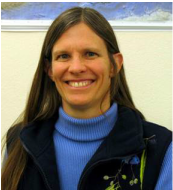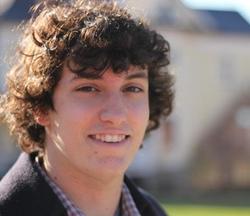
Martha S. (Molly) Hunter, Professor.
Inherited, intracellular bacterial symbionts, once acquired by an arthropod, can change the biology of the host dramatically and virtually instantaneously. Recent years have brought recognition that symbiont genes are an important source of evolutionary novelty among insects generally, and may be critical drivers of insect diversification. I am particularly interested in the role of symbionts in the ecology and reproduction of their hosts. I study reproductive manipulation by symbionts that cause parthenogenesis or the reproductive incompatibility known as cytoplasmic incompatibility, but also symbionts that influence the ecology of their hosts by influencing defense against natural enemies, or confer benefits, sometimes conditional ones. We are currently continuing on a mechanistic study of Cardinium causing cytoplasmic incompatibility, and are also studying how the leaf-footed bug Leptoglossus zonatus acquires and is influenced by its Burkholderia symbiont. I have also enjoyed the opportunity to mentor great students with independent projects, such as Cara Gibson's yeast symbiont studies, and Joe Deas' seed beetle defensive oviposition behavior work. mhunter@ag.arizona.edu
Inherited, intracellular bacterial symbionts, once acquired by an arthropod, can change the biology of the host dramatically and virtually instantaneously. Recent years have brought recognition that symbiont genes are an important source of evolutionary novelty among insects generally, and may be critical drivers of insect diversification. I am particularly interested in the role of symbionts in the ecology and reproduction of their hosts. I study reproductive manipulation by symbionts that cause parthenogenesis or the reproductive incompatibility known as cytoplasmic incompatibility, but also symbionts that influence the ecology of their hosts by influencing defense against natural enemies, or confer benefits, sometimes conditional ones. We are currently continuing on a mechanistic study of Cardinium causing cytoplasmic incompatibility, and are also studying how the leaf-footed bug Leptoglossus zonatus acquires and is influenced by its Burkholderia symbiont. I have also enjoyed the opportunity to mentor great students with independent projects, such as Cara Gibson's yeast symbiont studies, and Joe Deas' seed beetle defensive oviposition behavior work. mhunter@ag.arizona.edu

Suzanne Kelly, Research specialist and lab manager.
I am involved with all funded research in the Hunter laboratory, including training and mentoring newcomers to the laboratory, especially undergrads, helping with experimental design, assisting with experiments, data entry, and editing manuscripts. I also conduct independent projects, including electron and fluorescence microscopy projects and projects that use qPCR, for example determining symbiont titer and evaluating expression of candidate symbiont genes with RT-qPCR. suekelly@ag.arizona.edu
I am involved with all funded research in the Hunter laboratory, including training and mentoring newcomers to the laboratory, especially undergrads, helping with experimental design, assisting with experiments, data entry, and editing manuscripts. I also conduct independent projects, including electron and fluorescence microscopy projects and projects that use qPCR, for example determining symbiont titer and evaluating expression of candidate symbiont genes with RT-qPCR. suekelly@ag.arizona.edu

Matt Doremus, Postdoc
I am interested in the ecology and evolution of heritable symbioses in insects, with a particular interest in both the effects of heritable symbionts on host ecology and also how the interactions between host and symbiont are maintained in nature. Symbiont requirement for their host has spurred the development of a variety of strategies by symbionts to better ensure their own persistence in populations, most often by conferring some benefit to the host or by manipulating host reproduction to favor symbiont transmission, both of which often have drastic consequences on host ecology. For my Master’s research, I studied defensive mutualistic symbionts of the pea aphid; currently, my focus has switched to studying reproductive manipulators, particularly the mechanisms underlying manipulation of host reproduction via parthenogenesis induction by the heritable symbiont, Cardinium, in parasitoid wasps in the genus, Encarsia. mdoremus@email.arizona.edu
I am interested in the ecology and evolution of heritable symbioses in insects, with a particular interest in both the effects of heritable symbionts on host ecology and also how the interactions between host and symbiont are maintained in nature. Symbiont requirement for their host has spurred the development of a variety of strategies by symbionts to better ensure their own persistence in populations, most often by conferring some benefit to the host or by manipulating host reproduction to favor symbiont transmission, both of which often have drastic consequences on host ecology. For my Master’s research, I studied defensive mutualistic symbionts of the pea aphid; currently, my focus has switched to studying reproductive manipulators, particularly the mechanisms underlying manipulation of host reproduction via parthenogenesis induction by the heritable symbiont, Cardinium, in parasitoid wasps in the genus, Encarsia. mdoremus@email.arizona.edu

Liam Sullivan, MS student
I am interested in the influence and role of insect symbionts in the behavior and biology of their hosts. My research is focused on the interaction between the soil-dwelling bacterium Burkholderia, and its host, the leaf-footed bug Leptoglossus zonatus. Much of the research into insect symbionts has been centered on heritable symbionts that are passed from parent to offspring. The Bug-Burkholderia system, however, is unique in that a free-living bacterium is acquired from the environment each generation. This system poses interesting questions about how the need for a symbiont may drive the behavior of the insect, and how a free-lliving symbiont could convey localized benefits to its host. ltsullivan@email.arizona.edu
I am interested in the influence and role of insect symbionts in the behavior and biology of their hosts. My research is focused on the interaction between the soil-dwelling bacterium Burkholderia, and its host, the leaf-footed bug Leptoglossus zonatus. Much of the research into insect symbionts has been centered on heritable symbionts that are passed from parent to offspring. The Bug-Burkholderia system, however, is unique in that a free-living bacterium is acquired from the environment each generation. This system poses interesting questions about how the need for a symbiont may drive the behavior of the insect, and how a free-lliving symbiont could convey localized benefits to its host. ltsullivan@email.arizona.edu




